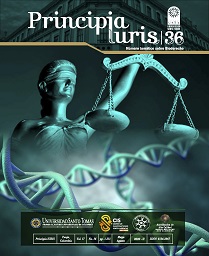Principles of european biolaw
Main Article Content
Abstract
Article Details
Por medio de esta comunicación certifico que el artículo que estoy presentando para posible publicación en la revista institucional impulsada de la Facultad de Derecho de la Universidad Santo Tomás seccional Tunja, Principia Iuris, es de mi entera autoría, siendo sus contenidos producto de mi directa contribución intelectual.
Todos los datos y referencias a publicaciones hechas están debidamente identificados con su respectiva nota bibliográfica y en las citas que se destacan como tal.
Por todo lo anterior, declaro que el material presentado se encuentra conforme a la legislación aplicable en materia de propiedad intelectual, y por lo tanto, me hago responsable de cualquier reclamación relacionada a esta.
En caso de que el artículo presentado sea publicado, manifiesto que cedo plenamente a la Universidad Santo Tomás seccional Tunja los derechos de reproducción del mismo y accedo a las modificaciones que de forma se requieran para adaptarse a la estética de la revista. Como contraprestación de la presente cesión, declaro mi conformidad de recibir (2) ejemplares del número de la revista en que aparezca mi artículo.
References
Kant, I. (1997). Groundwork of the Metaphysics of Morals. Cambridge: Cambridge University Press.
Kemp, P. (2007). La mundialización de la ética. Ciudad de México, Fontamara.
Levinas, E. (1961). Totalité et Infini. La Haye: Martinus Nijhoff. Levinas, E. (1969). Totality and Infinity. Toe Hague: M. Nijhoff, Publishers, Toe Hague.
Rendtorff, J.D. & Kemp, P. (2000). Basic Ethical Principles in European Bioethics and Biolaw, Vols. 1-2. Copenhagen and Barcelona: Centre for Ethics and Law & Institut Borja de Bioetica.
Ricoeur, P. (1992). Oneself as Another. Chicago: Toe University of Chicago Press.
Ricreur, P. (1990). Soi-meme comme un autre. Paris: Editions du Seuil. Singer, P. (2009). Animal Liberation. New York: Harper Perennial Modern Classics. Toe Danish Ministry of Trade and Industry (1999). An Ethical Foundation for Genetic Engineering Choices. http://www.evm.dk/ english/publications ?category=&year= 1999. Accesed 2 March 2015.
Valdés, E. (2015). "Biolaw, Genetic Harms and Fourth Generation Human Rights': Journal of Comparative Law 144, 2015: 1197-1226.

